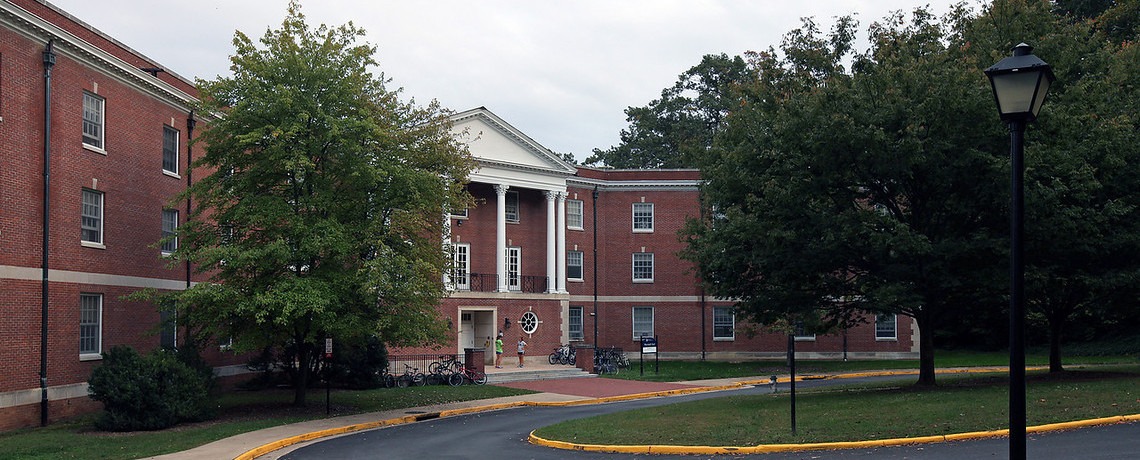Marshall Hall to be replaced by new theater under President Paino’s ten-year plan
4 min read
Norm Shafer | UMW ResLife
By HANNAH GALEONE
Senior Writer
As the community at the University of Mary Washington expands and grows, so will the campus and University facilities. Recently, UMW President Troy Paino announced a 100 million dollar, ten-year plan for updating and changing the campus. Included in this decade long project are the plans for the demolition of Marshall Hall and the addition of a new theater to the lower section of campus.
The plan to add a new theater to the University’s property will go hand-in-hand with other changes to the campus. The potential addition of a new performance space is part of a larger initiative to renovate the complex made up by DuPont, Melchers, and Pollard Halls. Planned to be placed on the south end of campus near the corner of Sunken Road and William Street, the new theater will “probably seat 300-400 people,” according to a Free Lance-Star article.
A University appointed committee worked alongside a team of architects in order to determine the best possible location for a new theater on campus.
“After identifying about three possible locations, the corner of Sunken Road and William [Street] seemed like an ideal place [for the theater],” said Paino. “It not only offer[s] sufficient space, it serv[es] as a very visible and strategic gateway to downtown [and] it is also directly across the street from a parking lot.”
The proposed venue would become the primary space for the UMW theatre program’s rehearsals and performances. This addition of theater space would free-up the current Klein Theatre for use by other fine arts programs such as music and dance. These renovations to the fine arts complex will cost an estimated 75 million dollars.
Along with being given a new purpose, the Klein Theatre, DuPont, Pollard, and Melchers Halls will be renovated and updated. These changes are necessary to assure that the buildings are both up-to-date and brought up-to-code.
“Pollard right now is not [American Disabilities Act]-compliant and it is in desperate, desperate need of attention,” President Paino said, according to the Free Lance-Star article.
The new theater space will help broaden the accessibility of performing arts to students with disabilities.
“I’m disabled [and] right now the theatre is not up-to-code,” said sophomore theatre major Maddie Neilson. “As an actor, I have to walk up a flight of stairs to perform. This new building would provide other disabled actors and disabled students the ability to perform.”

The Klein Theatre has been the University community’s main stage for the theatre and dance department since 1952 and is becoming out-of-date.
“Everything that needs to be accessed on [the new] stage is on one level,” said sophomore theater major Tommy Kelleher. “It’s a lot more accessible and easier for people to get around. The Klein theatre is very old. At this point, it’s completely necessary for the department to get a new space.”
The proposed new theater would be a more inclusive space for all students at the University and could be accessed by a greater number of people.
“Mary Washington’s big thing is inclusion and that’s not being upheld right now,” said Neilson.
Although the expansion of the fine arts department would benefit many on campus, students have also expressed their concerns with the project. These concerns include the proposed location of the new theater.
“I feel like a new theater is an awesome idea but maybe not in that location,” said freshman Jessica Dietrich.
The infamously steep Marshall Hill is a factor in students’ opinions of the chosen spot for the building.
“It kind of feels like they’re pushing theater into that corner of campus,” said theatre major Liz Fisher. “I lived in Marshall my freshman year and it’s pretty much hell getting up that hill.”
Students have also expressed that other parts of campus should be given attention.
“Instead of knocking down Marshall maybe they should renovate it,” said freshman international affairs major Killa Zadva. “I don’t think the arts department is big enough to make this expansion.”
“I think a lot of the dorms need renovating especially Russell and Marshall,” said Dietrich.
There are concerns that the demolition of a residence hall will create a shortage of space for students living on campus. But other parts of President Paino’s ten-year plan rely on the removal of Marshall.
“If necessary, we can expand the number of beds currently available in the University Apartments across the street,” said President Paino. “Currently those apartments have just over 300 beds, but we could easily expand to over 500 beds if we rebuilt new apartments at that location.”
The master ten-year plan also includes the addition of a parking garage behind the UMW apartments. This parking structure will be used for both students and guests of the theater.
According to Paino, the proposed changes to the lower half of campus and the fine arts buildings on College Avenue will allow the University to grow and benefit both theater and non-theater focused students.
“We are a liberal arts school that offers students the opportunity to engage in a variety of interests and passions while attending school here,” said President Paino. “You can be an athlete, biology major, and still find the space to engage with the arts.”
President Paino also said that the new theater will be a place that all students and community members can enjoy and will be hugely beneficial to the University community.
“Creativity is critical for success in a 21st-century economy,” said Paino. “…the integration of these programs into our broader academic experience helps make the case for the value-added of a Mary Wash education.
The completion of the new theater project is scheduled to be finished in the fall of 2022.


